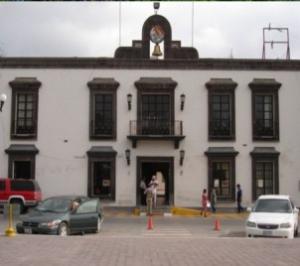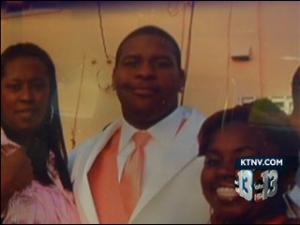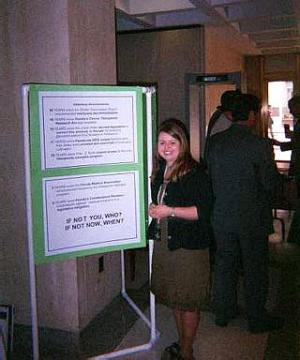Canadian Prime Minister Steven Harper and his Conservative buddies are dead set on passing a draconian, backward-looking drug sentencing bill, but they are going to run into a lot of opposition.
Faced with a mounting death toll, Mexican President Felipe Calderon has called for a debate on legalizing drugs, but it doesn't look like it's going anywhere just yet.
California's Prop 19 marijuana legalization initiative picked up two important endorsements this week, while the powerful state prison guard union says it is neutral.
Now, here's a shocker -- not. Drug czars oppose pot legalization. Take a look at their arguments, then read the critics.
The Mexican military shot and killed a US citizen on a coastal highway Saturday night. They said he attacked them while driving toward them. The consulate wants an investigation.
The discovery of the bodies of 72 people, probably Central American immigrants, on a farm not far from the US border, is the latest gruesome "top that" moment in Mexico's unending prohibition-related violence.
A coroner's inquest has found the killing of an unarmed 21-year-old man in a Las Vegas drug raid over 1.8 ounces of pot "justified."
The coroner's inquest for Trevon Cole is over and his killer has been cleared. Now, the attorney for Cole's family is getting ready to file a wrongful death, civil rights, and maybe even a RICO lawsuit.
The leading cause of deportation under the US government's criminal alien removal program is drug offenses, the Department of Homeland Security reports. Anything from being a cocaine kingpin to smoking a joint can get you deported.
A face we're used to seeing at drug reform conferences will now be plastered on campaign posters as Floridian Jodi James wins her state House Democratic primary and focuses on knocking off the Republican incumbent.
A Texas DA plays funny with the drug money, so does a Baltimore narc, and cops in Alabama, Georgia, and Oklahoma join the hall of shame.
The German health ministry announced last week that it was moving to legalize medical marijuana, and that no law changes are necessary, merely the changing of some regulations.
Events and quotes of note from this week's drug policy events of years past.
Canada's Conservative minority government hopes the third time is the charm for its controversial measure to increase sentences for marijuana cultivation and introduce mandatory minimum sentences for some drug offenses. Now known as S-10, the measure will be taken up by the Senate when it returns from recess at end of next month.

Parliament Hill, Ottawa (math.nist.gov)
The bill is designed to "send a message" that "if you sell or produce drugs, you'll pay with jail time," Justice Minister Rob Nicholson said when re-filing the bill in May.
Under the bill, anyone growing six or more plants for the purpose of drug trafficking could face a mandatory minimum six month jail sentence, with a one-year mandatory minimum for up to 200 plants and two years for up to 500 plants. Hash makers also face a one-year mandatory minimum.
The mandatory minimum sentences could be increased by half if any of a number of aggravating factors are claimed. These include whether a weapon was found on the premises, if minors were involved, if the location was unsafe, and whether pot production posed a danger to the public in a residential area.
The Conservatives' bill comes even as
crime rates in Canada have fallen to a 30-year low and with
majorities supporting marijuana legalization in recent polls.
"This is a terrible bill," said Jacob Hunter of
Why Prohibition?, a web site set up by opponents of the bill to encourage online activism and social networking to defeat it. "I think the single worst provision is the 18-month mandatory minimum for making one pot brownie if the police can show you shared it with friends."
"The Conservatives have less than a third of the popular vote, and they think they have a mandate for these draconian measures," said Eugene Oscapella, an Ottawa law professor and head of the
Canadian Foundation for Drug Policy.
Last year's version of the bill, known as C-15, made it through the House of Commons with the support of the Liberals, but was softened slightly by Liberals in the Senate. But before the amended measure could pass, Prime Minister Harper ended the parliamentary session, killing the bill for the year.
In power since the 2006 elections, the Conservatives have been unable to win enough seats to form a majority government. Right now, the Conservatives hold 143 seats of the 307 in the House of Commons, with the Liberals holding 103, the Bloc Quebecois 51, and the New Democrats (NDP) 51.
That means the Conservatives are once again going to have to win over members of other parties to pass S-10. With the NDP and the Bloc both in solid opposition, the Conservatives will have to pick up support from the Liberals, but whether they will be able to do so remains to be seen. Last time, Liberal support got the bill over the top in the House, but this year, the Liberals are preparing for a possible called election in the fall or winter and may have had an infusion of spine-stiffener on the issue.
"The Liberals are running around like the cowardly lion," said Oscapella, who expressed dismay at their lack of principle. "There is no sign yet that they are doing anything other than kowtowing to the government on this issue."
"Last time the Liberals did support C-15 in the House, but modified and delayed it in the Senate," said Hunter, who was slightly more positive about the Liberals. "They were terrified of being soft on crime. This time, I'm hearing the Liberals won't be so easily cowed. They feel they can counter the soft on crime attack by attacking the Conservatives on cost. It will be a purely political decision for the Liberals."
Noting that the parliamentary budget office has set the price-tag of S-10 at $10 billion, Hunter said the high cost would be a wedge to use against the bill. "This has emboldened the opposition to attack the Conservative's law and order crime agenda as too costly," he said. "Plus, crime is a historic low, and these mandatory minimum policies have been tried in the US to poor effect."
In the Senate, Conservatives do have an outright majority of 54 of 105 Senate seats -- if the two Progressive Conservative senators are counted. The Liberals have 49 seats, and there are two independents. Conservative strength in the Senate may explain why the Harper government decided to place S-10 in the Senate instead of the House of Commons.
Opponents of S-10 are gathering their forces. They will have months or perhaps even a year to mobilize opposition as the bill moves through the parliamentary process.
"There is a lot of opposition to this bill in the media, which is coming out strongly against mandatory minimums and in favor of ending the war on drugs," noted Oscapella. "Yet the government wants to plow ahead. Faced with strong opposition, the more adamant they are that they will succeed," he said.
"This is all the more depressing because for years, the excuse was that the US would never let us do drug reform," the Ottawa attorney continued. "Now the rhetoric and the attitude in the US is changing, and this would be a time for us to move forward, but we're set to move backward. It's like George Bush came to Canada."
NDP MP Libby Davies, the party's drug policy critic, has been a stalwart in the fight against earlier incarnations of the bill and is likely to do so again. While, the East Vancouver MP was out of the office this week,
Davies spoke out against the new bill back in May when it was introduced.
"I have been working at every turn to stop this failed, George Bush style war-on-drugs Bill that proposes mandatory minimum sentences for drug crimes," Davies said. "My NDP colleagues and I voted a resounding no when this bill was introduced in the House as Bill C-15, but it was passed with the support of the Liberal Party. Now we have a second chance to stop this wrong-headed and costly legislation. The Conservatives’ iron fisted approach that criminalizes drug users is taking Canada in the wrong direction."
Why Prohibition? and other activist groups are preparing protests across Canada on October 2, as well as bombarding parliament and the government with messages opposing S-10. And that will be just the beginning of the campaign.
It looks like the Liberals hold the key to whether S-10 passes or fails. In the months ahead, expect the pressure on them to increase dramatically. And let's hope for the Conservatives that instead of third time is the charm, it's three strikes and you're out.
back to top
When, earlier this summer, the Mexican government admitted that some 28,000 people had been killed in prohibition-related violence since President Felipe Calderon rolled out the army in December 2006, it seemed to mark a turning point in Mexico's ongoing debate over how to end the madness. Calderon began an ongoing series of meetings with civil society organizations, government functionaries, and the political parties, and even suggested that drug legalization was open for debate.

Feb. '09 drug policy forum held by
Mexico's Grupo Parlamentario Alternativa
But he quickly stepped back from the abyss, clarifying that no, he did not support legalization and, yes, he was going to continue to rely on the Mexican military to fight the drug war for the rest of his term. Still, while the short-term prognosis for serious drug reform is poor, the president's stutter-step around the issue has opened the door for debate.
That doesn't mean any of the four legalization bills, mostly aimed at marijuana, in the Mexican Congress's lower chamber or the one in the Senate are likely to pass. After all, it was only last year that Mexico approved the decriminalization of the possession of small amounts of drugs (and even that was wrapped inside a broader bill aimed at widening the drug war). Analysts who spoke to the Chronicle this week agreed that while the increasingly open debate over legalization is a step in the right direction, reform is going to be an uphill battle, at least until Calderon's successor is chosen in 2012.
The series of meetings Calderon has been holding are a good thing, if long overdue, said Maureen Meyer, a Mexico analyst at the
Washington Office on Latin America. "With these encounters, he's getting more buy-in from all sectors -- civil society, the government, the political parties -- but it's late," said Meyer. "The critique of current strategy should have begun long ago. At least in the past few weeks, there has been more frankness in his discourse on the magnitude of the problem and more willingness to engage in discussion, but what that means in terms of policy remains to be seen."
What it does not mean, Meyer said, was real measurable progress toward legalization. "There are several bills that are looking at legalization, mostly of marijuana, and yes, this broader debate is happening, but it will be a long time before we see some legislative changes in the county," she said.
"The debate over legalization has already been going on for many years," said Jorge Hernandez Tinajero, a Mexico City political scientist and member of
CUPIHD (in English, the Collective for an Integrated Drug Policy). "It is the political class that has been slowest to enter into it, and especially the president, who was the last to concede that a discussion was necessary," he said.
"In reality, Calderon brought this up not because he thought he could win the debate, but because his strategy has been just a tremendous failure, and this disaster is reaching intolerable levels, including among his closest allies," Hernandez continued. "For example, the theme of legalization leapt up in an encounter with civil society organizations dedicated to security, and almost all of them are on the right."
But while the years of carnage under Calderon has opened the door for legalization, it is still a minority position even if it is gaining more high-powered adherents, such as Calderon's predecessor
Vicente Fox. None of the three main political parties are keen on it even if some political figures are keen to use the bloodshed as a club against Calderon. And from the north, the US is glowering down.
"I don't think drug legalization will go any further than a discussion among specific sectors of society," said Victor Clark Alfaro, head of the Bi-national Center for Human Rights in Tijuana. "It's mainly supported by intellectuals and academia, but it doesn't have the sympathy of the population as a whole, nor does it have the support of the US government," he argued.
Even if there is no political will to advance legalization in Mexico right now, the issue will continue to fester until it is addressed, said Larry Birns, director of the
Council on Hemispheric Affairs in Washington, DC. "The issue of legalization and decriminalization is not going to go away, it will hunker down in the suburbs of this debate, and at a certain point, will explode," he predicted.
"We don't know how or when this is going to end, but it won't end with this president," Clark said. "There are sectors of the population telling him to change his strategy, but Calderon has told society he is going to continue with the strategy until the end of his term. That means two more years of the same or worse. Probably worse," he predicted.
While political progress toward legalization and a reduction in violence appears blocked for now, Calderon's deployment of the Mexican Army and the bloody results of that deployment have damaged both the president and the military. It is also contributing to the likelihood that Calderon's conservative PAN (in English, National Action Party) could lose the presidency in 2012. The PAN fared poorly in off-year elections this summer.
"If you ask me how I will remember Calderon, it is the violence," said Clark. "The huge number of people getting killed with the war against drugs, the increasing activity of the drug cartels -- this war has obviously damaged Calderon's image instead of bolstering it, at least in our country," he said.
"Calderon's approval ratings are down from the beginning of his government, but they haven't decreased much lately," said Myer. "But if you ask a citizen in Ciudad Juarez, they tell you there's more violence than two years ago and they want the military and the federal police out. There is some hesitancy in continuing to support the PAN," she added. "It's not just the violence, it's also the economy."
The Mexican military, too, is seeing its image tarnished as it wages war against the drug traffickers and, seemingly, a substantial portion of the various local, state, and federal police forces, who are actually working for the so-called cartels. The number of human rights complaints against the military has climbed to more than 2,000 since it left the barracks at the end of 2006.
"Calderon played the military card, the ultimate card he had, but the military hasn't succeeded," said Birns. "It has instead generated negatives: increased violence, increased human rights violations, increased repugnance toward the military from the population. The army's commitment to the war has rendered it unpopular."
"When President Zedillo deployed the military in the 1990s, it was an institution with a good image in society, but when Calderon deployed them in large numbers the military is paying a price in terms of its image because of the increasing number of human rights violations," said Clark. "The soldiers lack training to deal with the drug war, but they are on its front lines."
But while it is the military waging the war, it is doing so on behalf of the governing elite. It is the president and the Congress who make the decisions, and when it comes to embracing drug legalization as a solution to the violence, they are just not there yet.
"The political class still doesn't understand the terms of the debate," said Hernandez. "Nor does it really know the drug problem. Our task as reformers now is to try to steer the discussion so they understand that drug legalization by itself is not going to end the problems of security, but it would help the drug problem."
While it is ultimately up to Mexico to resolve the problem of violence and insecurity related to the traffic in illicit drugs, there is something Americans can do to help, said Hernandez, and he wasn't referring to sending more guns and helicopters and DEA agents. What would help in Mexico would be watching California vote to legalize marijuana, he said.
"The debate in Mexico has also been pushed by the marijuana reforms in the United States," said Hernandez. "The perception is that while you are legalizing, we are killing ourselves. And the political class understands this, so the referendum in California is very important for us."
back to top
Proposition 19, the California marijuana legalization initiative, picked up endorsements from organized labor and a national group representing black police officers last week, while the deep-pocketed California prison guards' union has indicated it may sit out this campaign.

marijuana-plants_6.jpg
On Wednesday, the International Longshore and Warehouse Union (ILWU 00 the Longshoremen) 25,000-member Northern California District Council (NCDC) jumped on the legalization bandwagon, joining the Western States Council of the Commercial Food Workers Union (CFWU) in giving labor support to the initiative.
"The ILWU NCDC supports Prop 19 for good reason," said the union's statement. "The continued prohibition of marijuana costs society too much. Billions of our tax dollars are wasted annually on the prosecution and incarceration of many, whose only crime is using, growing and selling marijuana," the stevedores said.
"Peoples' lives are ruined for a lifetime because of criminal records incurred from using a drug that is used recreationally by people from all walks of life. Those criminal records fall disproportionately on the backs of workers, poor people, and people of color," said the ILWU NCDC.
On Thursday, the 15,000-member National Black Police Association (NBPA) climbed on board. While most law enforcement interest groups not unsurprisingly oppose Prop 19, the NCBA is by no means alone. Law Enforcement Against Prohibition (LEAP) and its 30,000 members also support it.
"When I was a cop in Baltimore, and even before that when I was growing up there, I saw with my own eyes the devastating impact these misguided marijuana laws have on our communities and neighborhoods. But it's not just in Baltimore, or in Los Angeles; prohibition takes a toll on people of color across the country," said Neill Franklin, a black 33-year veteran police officer who is LEAP's executive director. "This November, with the National Black Police Association's help, Californians finally have an opportunity to do something about it by approving the initiative to control and tax marijuana."
Meanwhile, in what could be a very large piece of good news for the Prop 19 campaign, Rolling Stone reported this week that the wealthy and powerful California Correctional Peace Officers Association is so far staying neutral on Prop 19. Two years ago, the prison guards' union helped kill a well-funded sentencing reform initiative when it ponied up $1 million for an ad campaign featuring Sen. Diane Feinstein (D) calling the measure a "drug dealer's bill of rights."
Legalizing pot would not have as much of an impact on prison guard jobs as the 2010 sentencing reform would have had, at least in the short term given federal prohibition, and the prison guards are staying quiet. "At this time, we haven't taken a position on Proposition 19, and it's not certain we will," union spokesman JeVaughn Baker said.
back to top
In an absolutely unsurprising turn of events, current head of the Office of National Drug Control Policy Gil Kerlikowske and five former drug czars have come out against Proposition 19, California's marijuana legalization initiative. The six bureaucratic drug warriors all signed on to an op-ed, Why California Should Just Say No to Prop 19, published in the Los Angeles Times Wednesday.

Drug Czar Gil Kerlikowske with President Obama
Joining Kerlikowske in the broadside against legalization were former drug czars John Walters, Barry McCaffrey, Lee Brown, Bob Martinez, and William Bennett.
The drug czars claim that Prop 19 supporters will "rely on two main arguments: that legalizing and taxing marijuana would generate much-needed revenue, and that legalization would allow law enforcement to focus on other crimes." Then they attempt to refute those claims.
Noting that marijuana is easy and cheap to cultivate, the drug czars predict that, unlike the case with alcohol and tobacco, many would grow their own and avoid taxes. "Why would people volunteer to pay high taxes on marijuana if it were legalized?" they asked. "The answer is that many would not, and the underground market, adapting to undercut any new taxes, would barely diminish at all."
Ignoring the more than 800,000 people arrested for simple marijuana possession each year, including the 70,000 Californians forced to go to court for marijuana possession misdemeanors (maximum fine $100), the drug czars claim that "law enforcement officers do not currently focus much effort on arresting adults whose only crime is possessing small amounts of marijuana."
They then complain that Prop 19 would impose new burdens on police by making them enforce laws against smoking marijuana where minors are present. Those laws already exist; Prop 19 does not create them.
The drug czars warn that if Prop 19 passes, "marijuana use would increase" and "increased use brings increased social costs." But they don't bother to spell out just what those increased costs would be or why.
The drug czars' screed has picked up a number of instant critiques, including those of Douglas Berman at the
Sentencing Law and Policy blog, Jacob Sullum at
Reason Online, and Jon Walker at
Firedoglake.
We're waiting for a drug czar to come out for pot legalization, not oppose it. Now, that would be real news.
back to top
According to Mexican press reports, the Mexican military shot and killed a US citizen on the Acapulco-Zihuatenejo highway Saturday night. The American was identified as Joseph Steven Proctor, either 32 or 35 years old, of Georgia.
The incident took place on kilometer 14 of the coastal highway, near the village of Cerrito de Oro in the municipality of Coyuca de Benitez in the state of Guerrero. For more than 30 years, the Mexican military has conducted patrols and checkpoints on the highway as part of its "permanent campaign against drug trafficking."
According to Lt. Francisco Javier Escamilla of the 68th Infantry Battalion, soldiers in a Hummer driving toward Coyuca encountered a Winstar pick-up truck traveling toward them. The truck opened fire on the soldiers, and when it refused to stop, the soldiers shot back, causing the truck to overturn.
The Mexican army did not initially report the incident, only issuing its statement after police found Proctor's body. Instead, an anonymous call to state police reported the truck and the body around 2:00am Sunday morning. When police arrived, they found Proctor's body in the truck. It had multiple bullet wounds. They also found an AR-15 rifle with a 41-cartridge clip holding only 34 cartridges.
[Editor's Note: Anyone with experience firing a semi-automatic rifle at oncoming military vehicles while driving solo down the highway, please contact us. We want to know just how that is done.]
Proctor's body was taken to Acapulco for forensic examination, then turned over to his wife, Mexican national Liliana Gil Vargas. Gil Vargas told the newspaper Reforma that her husband had left their home in Coyuca de Benitez at about 10:00pm Saturday night to go shopping at a supermarket.
State and municipal police are investigating. The US consulate in Acapulco is asking that the military cooperate in the investigation.
While the Mexican military has long played a limited role in enforcing drug prohibition, President Felipe Calderon unleashed it in December 2006, deploying some 50,000 soldiers and federal police in hot spots across the country. It is widely accused of human rights violations, ranging from rape and robbery to torture, murder, and forced disappearances.
back to top
by Bernd Debusmann, Jr.
Mexican drug trafficking organizations make billions each year smuggling drugs into the United States, profiting enormously from the prohibitionist drug policies of the US government. Since Mexican president Felipe Calderon took office in December 2006 and called the armed forces into the fight against the so-called cartels, prohibition-related violence has killed more than 28,000 people, the government reported this month. The increasing militarization of the drug war and the arrest of dozens of high-profile drug traffickers have failed to stem the flow of drugs -- or the violence -- whatsoever. The Merida initiative, which provides $1.4 billion over three years for the US to assist the Mexican government with training, equipment and intelligence, has so far failed to make a difference. Here are a few of the latest developments in Mexico's drug war:

municipal building, San Fernando, Tamaulipas
In Ciudad Juarez,
12 people were killed in various parts of the city. In one case, a man on a bus was killed after being shot by another passenger, who was apparently following him and waiting for an opportune moment to strike. In another incident, a group of armed men stormed a house, killing one man and leaving a woman and a child wounded.
Friday, August 20
In Monterrey,
two private security guards were killed after a shootout in front of the prestigious American School Foundation, known for educating the children of many wealthy locals and those of American expatriates. The gun battle apparently began after the guards had a verbal altercation with a group of armed men who were driving near the school. Four guards who disappeared under unclear circumstances during the gunfight turned up safely on Friday. It is unclear whether the men fled or were kidnapped by the gunmen, as has been reported in the Mexican media.
Saturday, August 21
In El Paso, a bullet
fired during a gunfight in Ciudad Juarez struck a building belonging to the University of Texas at El Paso (UTEP). At least eight rounds fired in Ciudad Juarez have struck buildings in El Paso in recent weeks.
Sunday, August 22
In Cuernavaca,
four bodies were discovered hanging from a bridge. The bodies had been decapitated and mutilated, and their genitals had been removed. A note left at the scene indicated that the men were affiliated with American-born cartel figure Edgar Valdez Villareal, who is currently in a power struggle with Hector Beltran-Leyva for control of the Beltran-Leyva Organization. Cuernavaca has seen a dramatic surge in violence since cartel boss Arturo Beltran-Leyva was killed in December, leaving his organization leaderless.
Monday, August 23
In Hidalgo,
seven bodies were discovered inside two mines that were being used as clandestine graves by suspected drug cartels. Authorities were led to the mine by several suspects arrested last week, including three police officers. In May, a similar discovery in Taxco led to the discovery of 55 bodies.
In Ciudad Juarez,
five people were killed in several incidents in the city. Among the dead was a federal police officer who had been decapitated, dismembered, and whose body parts were left strewn along a highway. In another incident, a municipal policewoman was shot dead off-duty as she drove in a car with her child, who was left uninjured.
Tuesday, August 24
In Tamaulipas,
72 bodies were discovered at a farm after a gun battle in San Fernando, about 100 miles from Brownsville, Texas. The bodies were discovered by Marines acting on a tip from a man who claimed he was an illegal migrant who had been kidnapped. Initial reports suggest that the dead are mainly Central American immigrants who were killed after refusing to pay an extortion fee. Drug cartels, particularly the Zetas Organization which is powerful in Tamaulipas, have increasingly begun kidnapping migrants in addition to narcotics smuggling.
Near Acapulco,
two bodies were discovered hanging from an overpass bridge on the highway from Chilpancingo. Their arms had been chopped off and a note was left with the bodies threatening extortionists, kidnappers, and the army.
In Mexico City,
investigators from the UN and the OAS said that Mexico was the most dangerous place for journalists in the Americas. Some 60 journalists have been killed in the country since 2,000, according to the National Human Rights Commission.
Wednesday, August 25
In Sinaloa,
three young men were found dead inside a car near the town of Las Palmas. All three had been reported missing on Sunday. At least one of the bodies, found in the trunk of the car, had signs of torture. All three had been shot.
Total Body Count for the Week: 301
Total Body Count for the Year: 7,331
Read the previous Mexico Drug War Update here.back to top
The Las Vegas police officer who shot an unarmed Trevon Cole during a June drug raid over small-time marijuana sales was justified, a coroner's inquest found Saturday night. The ruling came late in the evening after an inquest that was supposed to end Friday dragged through the day and into the night Saturday. (See our recent coverage of the case here and of a looming lawsuit over the killing here.)

Trevon Cole and his fiance Sequoia Pearce, nine
months pregnant at time of shooting
Of about 200 Clark County coroner's inquests in officer-involved killings since 1976, only one has resulted in a finding of criminal negligence. Whether that near-perfect percentage of acquittals results from exceptionally good police work in Las Vegas, or an inadequate process and institution, depends on who one asks.
Cole, 21, and his pregnant fiancé, Sequoia Pearce, were at the apartment they shared when police serving a search warrant burst through their door. Cole was shot in the bathroom by Det. Bryan Yant, who, in
testimony Saturday afternoon, said he kicked in the bathroom door and saw Cole squatting by the toilet, apparently flushing marijuana. He said Cole rose to his feet while moving his hands in a shooting motion and that he saw something silvery or metallic in Cole's hand. He then fired once, killing Cole.
"Unfortunately, he made an aggressive act toward me," said Yant under questioning from Assistant District Attorney Chris Owens. "He made me do my job."
Owens questioned Yant sharply at times, suggesting that Yant's weapon had accidentally discharged as he came through the door. Owens cited the position of Cole's body on the floor and the downward trajectory of the bullet as it entered his cheek before lodging in his neck, which suggested that Cole was still kneeling when shot.
No gun or other silvery or metallic objects were found in the bathroom. But clutched in one of Cole's hands was a yellow tube of lip balm.
The inquest also heard testimony about errors in the search warrant application written by Det. Yant, in which he misidentified Cole as another Trevon Cole -- from a different city, with a different date of birth, different middle initial, and a dramatically different physical description. Yant also mischaracterized the other Trevon Cole's police record as including drug trafficking offenses, when all that came up was some possession misdemeanors.
Chief Deputy District Attorney Christopher Laurent asked Sgt. John Harney, who led the team conducting the raid, if he agreed that Yant's work on the affidavit was "sloppy," but Harney said, "No, it was a mistake."
Immediately after the verdict was announced, Clark County Sheriff Douglas Gillespie issued a
statement saying that the Las Vegas Metropolitan Police Department's internal investigation continues and that until it is completed, the department's SWAT team, "which trains regularly and is well-suited for high-risk operations," will be handling all forced entry search warrants.
"The Department will examine the narcotics investigation; supervision that led to the identification of Mr. Cole as a suspected narcotics dealer; all related policies and procedures pertaining to the writing and serving of the search warrant; and the decisions made by officers assigned to this incident," the statement said. "The results of Metro’s internal investigation, and any recommended policy changes, will be made public."
In the meantime, the family of Trevon Cole is preparing a lawsuit alleging wrongful death, civil rights violations, and possibly a RICO claim. Talk is cheap; paying for questionable police killings is not.
back to top
(This article includes minor updates from the original version published 8/19/10.)
Andre Lagomarsino, the attorney representing the estate of Trevon Cole and his fiancé, Sequoia Pearce, said last Thursday he is considering a RICO (Racketeer Influenced and Corrupt Organizations Act) lawsuit against the Las Vegas Police Metropolitan Department in the shooting death of Cole in a June drug raid at the apartment shared by Cole and Pearce. In addition to a possible RICO claim, the lawsuit would assert wrongful death, assault and battery, and intentional infliction of emotional distress. It would also assert civil rights violations.

Trevon Cole
"We are considering a RICO claim," Lagomarsino told the Chronicle. "The claim would say there is a pattern of criminal conduct by this organization. A similar claim was brought against the LAPD. It only takes two events to constitute a pattern under RICO," he said.
There is already one other questionable police shooting that could be the second event. Last month,
Las Vegas police shot and killed Erik Scott, 39, outside a Costco store in Summerlin. There have been five officer-involved shootings in the city so far this summer and 17 this year, though Cole and Scott were the only fatalities among them.
Though best known for its criminal provisions targeting certain criminal enterprises with asset forfeiture and up to 20-year sentences per racketeering count, the RICO statute also has a
provision allowing for civil lawsuits by plaintiffs claiming to have been harmed by those enterprises. Successful plaintiffs can collect
treble damages.
Cole was fatally wounded by Detective Brian Yant as he and other officers executed a search warrant alleging that Cole had sold 1.8 ounces of marijuana to undercover officers in three buys over a series of week. Cole was unarmed. Yant said he shot after Cole made "a furtive movement," but Pearce, who was present during the raid, said Cole was on his knees with his hands raised and complying with commands when he was shot.
Yant has been involved in two other questionable shootings, one of them fatal. In that incident, Yant said the victim was threatening him with a gun, but the gun was found 35 feet away from the victim's body.
Yant also misidentified Cole as another Trevon Cole from Houston, Texas, despite the two men having different dates of birth, middle initials, ages, and appearances. He also mischaracterized the record of the Houston Trevon Cole, portraying him in the search warrant affidavit as a major drug dealer when his only arrests were marijuana possession misdemeanors. (See more detailed coverage of the raid and its aftermath
here.)
When there is a police-involved fatal shooting in Las Vegas, it goes before a coroner's inquest to determine whether the officer involved was criminally negligent. That happened on Friday and Saturday, with the coroner's jury coming back with
a verdict of "justifiable" on the shooting. The finding was not unanticipated, especially given the history of coroner's inquests there (only one police officer has been found criminally negligent in about 200 inquests since 1976, and that verdict was later overturned) and the one-sided nature of the inquest process (only the district attorney can present evidence and ask questions), it is considered unlikely that Yant will be found criminally negligent.
"I would guess they will find it justified, but I'm hopeful they will look at the fact that [Cole] had nothing in his hands," Lagomarsino said the day before the inquest began.
While Lagomarsino also cited Yant's history of shootings "under suspicious circumstances," he pointed a finger at the police department too. "This is cleared at higher levels," he said. "It is the policy and procedure of the Metro police to conduct these raids the way they do."
The Las Vegas attorney told the Chronicle last week that once the inquest was over he would file a lawsuit "within two or three weeks." He told
local media Monday the lawsuit will now move forward, although he did not outline its precise shape.
back to top
Update: When published, this article incorrectly reported that aliens in the US face deportation for even a single marijuana possession misdemeanor. No, it takes two misdemeanor marijuana possession offenses to do that. We have modified the article accordingly.
The United States last year deported more than 128,000 foreigners for committing crimes in the US, with people convicted of drug offenses making up nearly one-third of the total, according to a Department of Homeland Security report released last week. Some 37,000 foreign nationals were deported for drug offenses in fiscal year 2009, the report found, or 29.6% of all those deported under the criminal alien removal program.

Immigration and Custom Enforcement (ICE) photo
Under US immigration laws non-citizens can be deported for any drug offense, except the simple possession of marijuana--although a second pot possession offense qualifies as deportable. The report supplies no breakdown of how many people were deported for which drug offenses.
The number of people deported for drug offenses was nearly double the second and third place offense categories. More than 20,000 people were deported for traffic violations and more than 19,000 were deported for immigration offenses.
Persons convicted of what are commonly considered serious crimes (assault, larceny, burglary, robbery, fraud, sexual assault) made up only 20.7% of those deported. "Family offenses" accounted for another 2%, while the category "other" included 16.5%.
Overall deportations are down from last year, with 290,000 people being removed by July 22, the agency reported. At the same time last year, 322,000 had been deported. But the percentage of people deported for committing crimes is up to nearly 50% this year, compared to 30% for the same period last year.
The Obama administration's push against criminal immigrants has been criticized both by advocates of tougher immigration policies, who applaud the crackdown on criminals but want to see it extended to non-criminal aliens, and by immigration rights activists for deporting more people than the Bush administration and deporting people, including some who have spent their entire lives here, for minor criminal offenses.
back to top
Long-time drug reform advocate Jodi James has won the Democratic primary for Florida House District 31, in Brevard County on the Central Florida Atlantic Coast. She will now face Republican incumbent John Tobia (R-Melbourne) in the November general election.

Jodi James at work
James also won the nomination in 2002, only to be defeated in the general election.
According to
official figures from the Florida Secretary of State's office, James pulled down 44% of the vote in a three-way race. Her two opponents split the remainder, coming in with 28% each.
As the
South Florida Gay News noted in bemoaning the loss of openly gay, fiscally conservative candidate Joe Pishgar in the race,"But Pishgar was not the only unique candidate in that race. Jodi James handily took the Primary as the NRA-endorsed daughter of a Deacon who wishes to relax marijuana laws and do away with FCAT testing in schools."
James has been active in drug reform politics since moving to the Sunshine State in 1995. She is a member of the
Drug Policy Forum of Florida and served as executive director of the
Florida Cannabis Action Network. She has also been active in Democratic Party politics at the state level.
On her campaign web site, James staked out a progressive position on criminal justice issues, saying: "Jodi James believes in a criminal justice system that focuses on restoration for the victim first. She supports everyone having equal access to the courts. Justice can only be served if everyone is equal in the eyes of the law. Jodi supports restoration of civil rights upon the completion of sentences and alternatives to incarceration when public safety can reasonably be assured."
In addition, in her "issues at a glance" section, she lists herself as supporting "smart on crime practices that bring justice to the victim" and "sensible drug policies that reduce crime." A link next to that item opens up the web site of
Law Enforcement Against Prohibition.
With her primary victory, Jodi James has taken another step on drug reform's long march through the institutions of power. Let's hope there are many more reformers following in her footsteps.
(This article was published by StoptheDrugWar.org's lobbying arm, the Drug Reform Coordination Network, which also shares the cost of maintaining this web site. DRCNet Foundation takes no positions on candidates for public office, in compliance with section 501(c)(3) of the Internal Revenue Code, and does not pay for reporting that could be interpreted or misinterpreted as doing so.)back to top
A Texas DA plays funny with the drug money, so does a Baltimore narc, and cops in Alabama, Georgia, and Oklahoma join the hall of shame. Let's get to it:

too much cash can corrupt cops
In East Brewton, Alabama, a
former East Brewton police officer was arrested August 17 for helping his brother burglarize a pharmacy and steal prescription drugs. Former East Brewton Police Lt. Matthew Kirk, 36, was indicted on two counts of burglary, third degree; one count of theft of property, second degree; and one count of an ethics violation. Kirk went down after his brother got popped selling stolen Xanax in Florida and ratted him out. When the brother's hotel room was searched, police found Xanax, oxycodone, methadone, morphine, and hydrocodone, according to previous reports. Kirk is currently being held at the Escambia County Detention Center in Brewton on a $100,000 bond.
In Alice, Texas, the
former Jim Wells County district attorney was indicted August 18 for illegally spending more than $200,000 in asset forfeiture funds on himself and three others in his office. Former DA Joe Frank Garza is charged with first-degree felony misapplication of fiduciary property. While the federal indictment uses the $200,000 figure, an audit by Garza's successor found that the former DA had paid $1.2 million in seized funds to his three staff members and $81,000 to himself between 2002 and 2008. The audit found money transferred to employees for car allowances, stipends, reimbursements, advances, audits, travel and contract labor. Under Texas law, DAs may use asset forfeiture funds to supplement staff salaries, but only with the permission of county commissioners. Garza never sought that approval. He was voted out of office in 2008.
In Atlanta, a
Clayton County police officer was indicted August 18 on charges he protected drug deals and stole money and guns from drivers during traffic stops. Clayton County Police Officer Jonathan Callahan, 27, faces nine federal charges, including three counts of aiding and abetting the distribution of more than 500 grams of cocaine, two counts of theft for stealing a firearm from a motorist and money from another, and possession of a stolen firearm.
In Baltimore,
a former Baltimore narcotics detective was sentenced August 18 to 20 months in federal prison for stealing money that was supposed to be used to pay snitches and stealing property found during drug raids. Former narc Mark Lunsford admitted pocketing $10,000 that he fraudulently claimed had been paid to an informant. He also admitted feeding information about a suspect to that same informant that allowed for a drug raid to take place, then claimed the informant had given him the information and asked for a 20% bonus for the informant, which the two then split. He also admitted to filing false reports and affidavits and stealing several items of expensive jewelry.
In Tulsa, Oklahoma, a
Tulsa Police officer who admitted committing crimes was fired August 19 after a Tulsa Police internal investigation revealed he had 'fessed up to the FBI during its investigation of the Tulsa corruption scandal that just keeps on giving. Officer Eric Hill was fired after making admissions during a June 7 interview with the FBI and federal prosecutors. He told the feds he had "replaced" drugs that officers failed to find at drug raids with dope that he or other officers brought to the scene. He also admitted receiving $500 stolen during a drug investigation.
back to top
Update: Since publishing this article, knowledgeable parties in Germany have informed us that the press reports we relied on in this article were incorrect. The government at this point is only moving to approve Sativex, a cannabis-based sublingual medication, not smoked or edible marijuana, and it is a step toward approving Sativex, not immediate availability of it. Once we can confirm that information, we will post a new story, as well as linking to it here.
Germany's health ministry has announced plans to allow the use of marijuana as a medicine. In an August 16 press conference, Health Minister Philipp Roesler told reporters that only changes in ministry policy would be required and that no changes in German law would be needed.

cannabis prescription legally produced in Netherlands (courtesy Marijuana Policy Project)
Although the medicinal qualities of marijuana are increasingly non-controversial in Europe, German lawmakers two years ago rejected a move to legalize medical marijuana. Individual patients have had to go to court to win the right to be prescribed, a state of affairs that has resulted in only 40 patients in the entire country having medical marijuana prescriptions.
Because medical marijuana is accepted in other European countries, legalizing it in Germany should go "quickly by comparison," Roesler said.
It is time for Germany to join the club, said health care professionals welcoming the move. "Because it is disproportionately difficult to obtain cannabis as medicine, many patients with chronic pain are currently forced into illegality," said Eugen Brysch of the German Hospice Foundation. Medical marijuana could play "an important role" in the treatment of the critically ill, he added.
"It's time to bring cannabis out from the shadows," said Gerhard Mueller-Schwefe, president of the German Society for Pain Therapy.
back to top
August 28, 1964: The Beatles are introduced to marijuana.
September 2, 1994: In Detroit, Judge Helen E. Brown sentences Lazaro Vivas to life in prison for possession of over 650 grams of cocaine. Judge Brown tells Vivas, "I don't think it's fair. It is not a sentence I would give you, if I had any choice. But I have to give you this sentence, because I have to follow the law. So, your sentence is life."
August 28, 1995: The World Health Organization (WHO) publishes "WHO Project on Health Implications of Cannabis Use: A Comparative Appraisal of the Health and Psychological Consequences of Alcohol, Cannabis, Nicotine and Opiate Use." The original version -- not the official one -- states,"... there are good reasons for saying that [the risks from cannabis] would be unlikely to seriously [compare to] the public health risks of alcohol and tobacco even if as many people used cannabis as now drink alcohol or smoke tobacco."
August 30, 1996: The Washington Post reports that Republican presidential hopeful Bob Dole hammered President Clinton for his drug policy and made the war on drugs one of his top campaign issues. Declaring that President Clinton had "surrendered" in the war against drugs, Dole called for an expanded role of the National Guard, and for military and intelligence services to fight drugs.
August 29, 2001: The Dallas Morning News reports that Ernesto Samper, the former president of Colombia, said, "The problem is the law of the marketplace is overtaking the law of the state... We have to ask, is legalization the way out of this? We cannot continue to fight this war alone. If the consuming nations do nothing to curb demand, to control money-laundering, to halt the flow of chemicals that supply the drug-production labs, then in a few short years the world is going to see legalization as the answer."
August 27, 2002: Canadian Press, Canada's national newswire, reports that Health Minister Anne McLellan said the federal government is not backing away from its plan to supply patients with medical marijuana. Bristling earlier reports that the project had been shelved, McLellan said, "In fact, far from shelving it, what we're doing is implementing the second stage."
September 1, 2003: In an effort to save over $30 million in general revenue in five years, Texas implements a new law that requires mandatory community supervision for first time drug offenders adjudged guilty of possession of less than one gram of certain controlled substances or less than one pound of marijuana. Under previous law, such offenders were only eligible for state jail community supervision or incarceration in a state jail facility.
back to top











